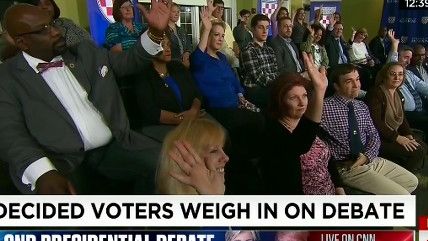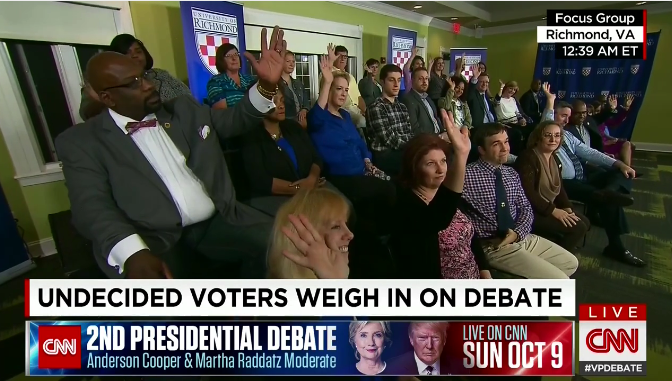CNN Accused of Bias Against Third Parties By a Post-Debate Focus Group Participant
By replacing "third party" with "undecided" as an option, is the network doing the bidding of the two-party duopoly?


During and after Tuesday's Vice Presidential Debate, CNN hosted a 28-person focus group of self-identified "undecided voters" at the University of Richmond (Va.). One of the participants in this group—Justin Smith—later complained on his Facebook page that CNN's Pamela Brown had asked the group if they now intended to vote for Donald Trump, Hillary Clinton, or an unnamed third party candidate. In Smith's telling, two supported Trump, five supported Clinton, and 12 indicated they would vote for a third party candidate.
But, Smith tells Reason, the producers then told the focus group they were going to "reshoot" the segment, only this time they replaced "third party candidate" as an option with "undecided." Smith says this caused confusion among the panel, leading some who had just raised their hands for "third party" to now raise their hands for "undecided."
An important difference between the two questions: the cameras were only airing live on CNN during the "undecided" question, whereas the "third party" question was taped.
Watch the segment that aired live—with "undecided" as an option as opposed to "third party"—below:
Smith's Facebook post has caused a bit of a stir online, with accusations that CNN is censoring third party supporters to favor a narrative in which the only opinions worth considering are from voters who support Trump, Clinton, or have not yet decided between the two. The Intercept's Glenn Greenwald weighed in on Twitter this morning, offering his opinion that "If this account is accurate, it comes pretty close to actual fraud."
Though he has a "Evan McMullin for President" poster as his Facebook profile cover page, Smith tells Reason he is an undecided voter, it's just that he hasn't decided which third party candidate he will vote for. He calls himself a constitutional conservative and insists he will absolutely not vote for Trump and Clinton. For a while, he had considered voting for Constitution Party candidate Darrell Castle, but he's not on the ballot in Virginia, so Smith is now on the fence between voting for McMullin or Libertarian candidate Gary Johnson.
Smith says CNN producers told the focus group they would be taping certain questions as segments that might be used by CNN shows the next morning—a common TV news practice. Smith added that each of the questions they had been asked as a group had been taped twice. As a former cable TV news producer myself, I can attest that shooting more "packages" than you're likely to need is standard operating procedure. It's entirely possible that there was no nefarious intent on the part of CNN behind the creation of a taped package which included third party as a voting option.
But the fact is, when the cameras went live, Brown didn't give the group the option of choosing a "third party." Live TV viewers were left with the impression that the majority of the focus group was undecided between Trump, Clinton, and no one else.
"I was shocked that they would purposely not put it out there that people were supporting a third party," Smith told Reason, adding, "Intentionally covering that up…I can't imagine what their narrative is."
CNN did not respond to requests for comment.
Is it just an odd turn of events that the "undecided" question went out on live TV while the "third party" question went to tape? It's not clear whether the latter ever aired the next morning and I haven't been able to find a clip of it on CNN's website, but sometimes producers are left with more content than they can use. It's also important to note that CNN hasn't ignored third parties this election cycle; they have aired two Libertarian town halls in recent months, after all.
However, editorial choices—such as deciding which questions get aired with the most viewers watching immediately after a debate, while others may or may not get airtime at all—matter.
By prioritizing the idea that undecided voters are only choosing between Trump and Clinton, especially knowing that a great many of them are not undecided between the two but had in fact just affirmatively rejected the binary choice moments earlier, CNN (unwittingly or not) helped perpetuate a narrative that third party supporters are just undecideds who haven't yet come around to the correct line of thinking.
